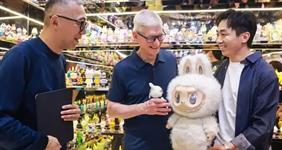Apple CEO Tim Cook made a surprise appearance on Douyin earlier this week, announcing that pre-orders for the iPhone Air will begin on October 17, with sales starting October 22.
The launch follows China’s approval for state telecom operators — China Mobile, China Telecom, and China Unicom — to conduct commercial eSIM trials, clearing a major hurdle for Apple’s first device without a physical SIM slot. Cook confirmed during the livestream that the iPhone Air will be sold through Apple’s official channels, untied to carrier contracts, and users will be free to switch eSIM plans.
Interestingly, his China trip also included a visit to Pop Mart founder Ning Wang and artist Kasing Lung at a Labubu exhibition in Shanghai. The photos of Tim Cook with a custom Labubu gift generated widespread social media buzz.
In an interview with , Cook expressed enthusiasm for his return to China, “I always love coming back. It’s wonderful to be back in Shanghai.” He also shared his love for his personal Labubu, saying, “I love it. I have my personal one now. It’s a one-of-a-kind, and I’m so impressed with it. I’m putting it right on my desk.”
Users on Xiaohongshu (Red) were quick to nickname the figurine “Tim-bubu” and “Lakuku.”

L-R: Kasing Lung, Tim Cook and Ning Wang
eSIM as a gateway
Apple’s iPhone Air is the company’s first model globally to rely solely on eSIM, which eliminates the physical SIM slot entirely. That design choice had delayed its China launch, because the country’s telecom environment lacked eSIM support.
And now with the regulatory green light, Apple can now push ahead in one of its most critical and competitive market.
China’s smartphone market is facing headwinds. IDC data shows Q2 2025 shipments fell 4.1% year-on-year, ending six consecutive quarters of growth. Apple now ranks fifth in market share behind Huawei, Vivo, Oppo, and Xiaomi.
Still, Cook’s timing is strategic. His visit comes right off the intensely competitive Golden Week and just before Double 11, China’s biggest e-commerce festival, when smartphone demand peaks. Local brands are also rolling out new models: Vivo launched its X300 series, Oppo is gearing up with Find X9, and Xiaomi’s 17 series has been on shelves since September.


